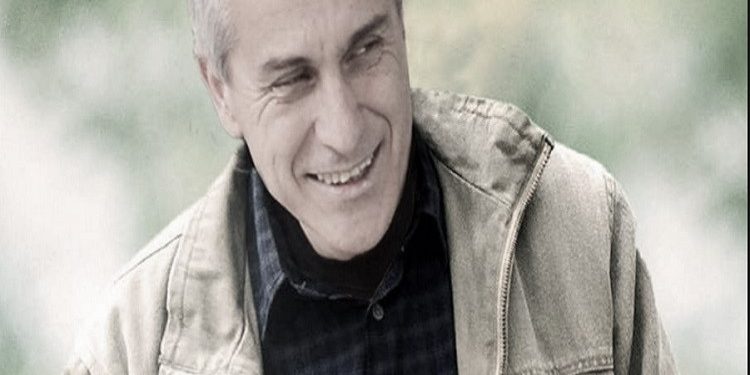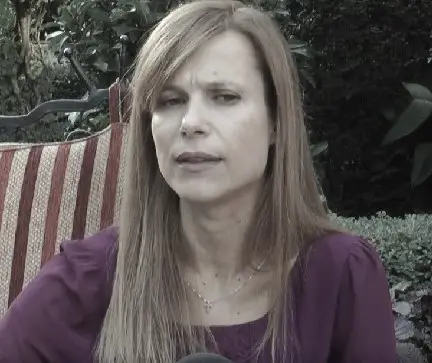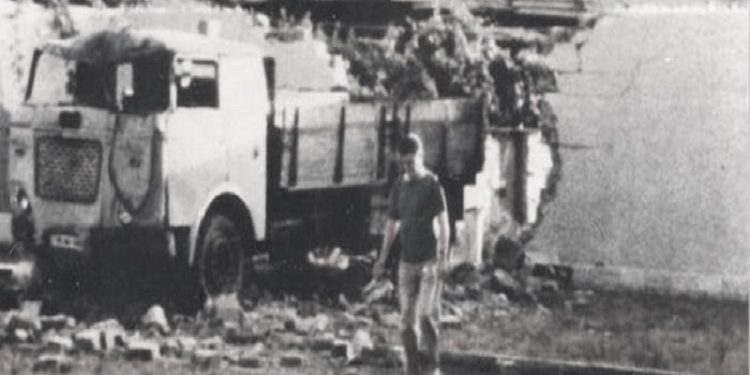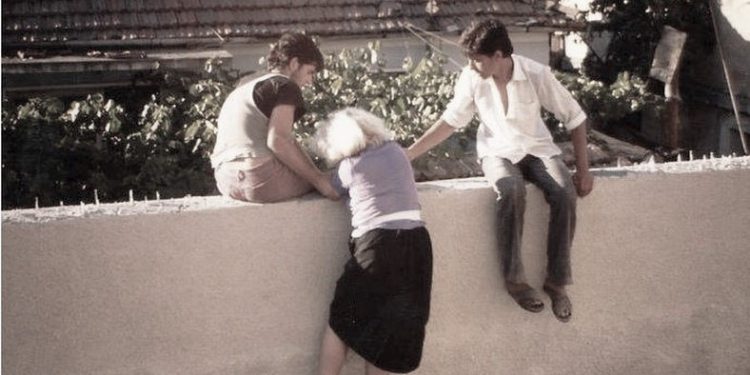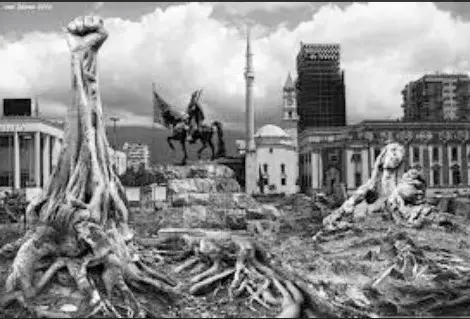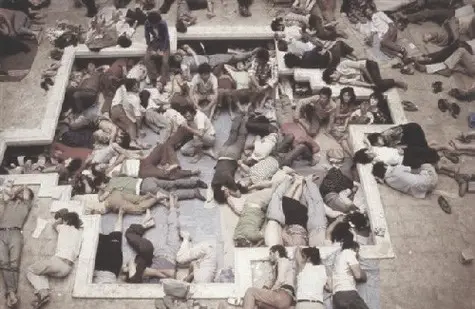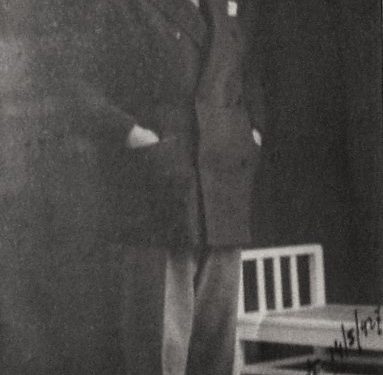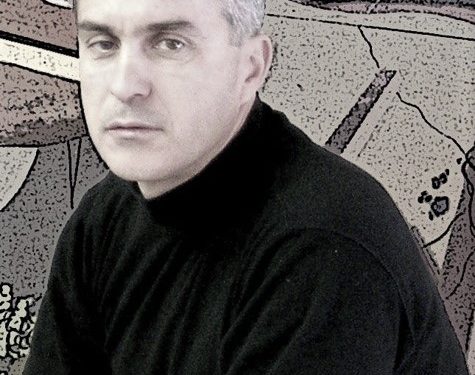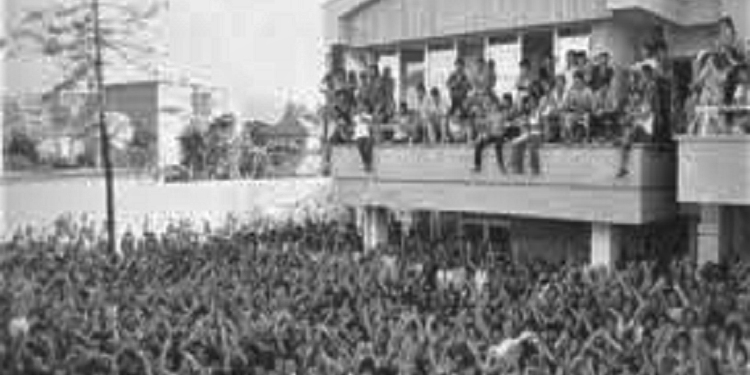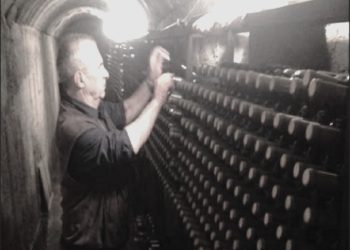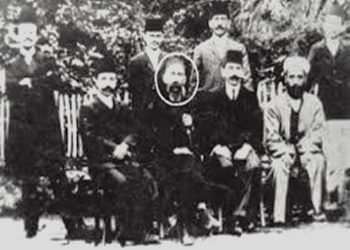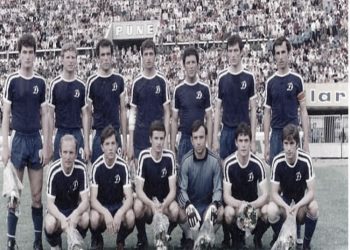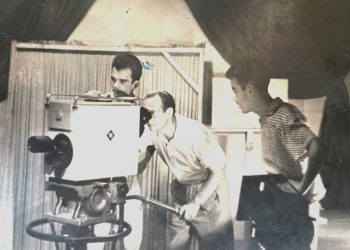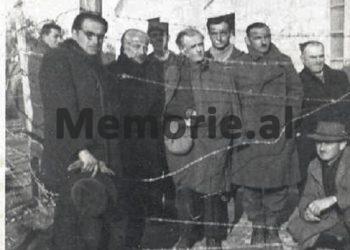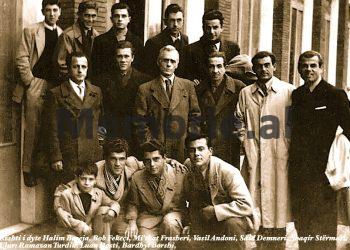From Alma Mile
Memorie.al / He has seen an entire tribe trample under the dictatorship, even though the door of the Delvinas had given Albania a lot, he had visited the closest people in prisons and exiles, he was denied an education, he experienced the pressure of the State Security, until decided to leave Albania, entering the Italian Embassy, on July 2, 1990. 23 years have passed since then, and to the painter Avni Delvina, it seems as if he was not the one who lived those days. He has already built his life in Italy, has a son who was born just a few months after leaving the sea, named Steve (like Stevie Wonder) and a daughter Lara, in honor of all the girls and women who suffered under the dictatorship. He is a successful artist and very active in the Italian artistic life, but also in social networks through “provocations”, through his graphics, where he ironizes everything, from the past under the dictatorship, to everyday phenomena. Honored by the President of the Republic, Bamir Topi and one of the 100 outstanding Albanians in the world, Avni Delvina, who bears the name of his grandfather, delegate of Delvina and Saranda, on November 28, 1912, goes back in time. It tells about the family, the ordeal of suffering and July 2, 1990. What was happening inside the Italian Embassy, how the party-state reacted and how they were received in Italy?
Mr. Avni, you bear the name of your grandfather, a signatory of Independence, what did a patriot ask for in the yard of a foreign embassy on July 2, 1990?
Linda and I grew up in a family that did not start the fight against communism in the 90s, but in the 40s. A family with patriotic traditions, enough to mention characters such as: Sulejman Delvina, the Prime Minister of the Government of Lushnja, Grandfather Avni Delvina, whose name I bear, who was a delegate of Delvina and Saranda, during the Declaration of Independence in 1912, but many others too.
It has happened that many families, for different interests, have sided with the occupier, while the Delvina family has no “taint” in this regard and I am proud of it. But, regardless of the contribution it has made to the history of this country, arrests, imprisonments, murders have constantly followed this family, which caused the anti-communist feeling and strength of character to be created in me.
And yet, in this saga there must be one event that has left the most imprints on you, right?
I remember very well, when I was only 10 years old, going to prison with my mother’s first cousin, Xelal Koprencka. He always kept me by his side and when I visited him during his sentence second, I remember his proud eyes, shaved head, behind prison bars. I can remember Astrit Delvina, the grandson of the great patriot Namik Delvina, close collaborator with Ismail Qemali, sentenced to 20 years in prison and exile, to continue with my uncle, guitarist Mehdi Prodani, sentenced to 8 years in prison… ! And all these stories, what they had transmitted to me, greatly influenced my formation and the formation of that army that opposed the iron communist dictatorship.
An event that has marked me strongly was the summons from the State Security, in 1978, to testify for my friend, Ilir Malindi. It took me two days to convince me. I was only 19 years old and I remember kissing my mother on the forehead when I told her what had happened and that I had refused to testify. Just as shocking were the escape of my cousins, Izabela and Zamira Islami, and the drowning of their brother in Saranda. In fact, he invited me to go too, and I have a pawn today, because I wonder what would have happened if I had gone too…?!
But what happened to the Delvina family, whose contribution history recognized?
History was manipulated; the truth was kept hidden, since the communist government did not like tradition. They wanted everything to begin in 1941. Life began with them.
How do you remember July 2 after 23 years?
I remember meeting my mother and father. They were the ones who pushed me: Go, they told me, go away! We hugged. I also took my daughter-in-law, who was pregnant at the time, even in maternity leave. Once I thought of leaving her, but she insisted and we both entered the Italian Embassy.
How the entrance to the embassy was prepared, what was the atmosphere like?
The great leader of communism was the end of Nicolae Ceausescu. That was the final blow. At foreign stations, we watched what was happening in Romania. The example of the Romanian people was decisive. Without question it was the fall of the Berlin Wall…! All these created the ground. We entered the Italian Embassy and felt like we were drunk. It was the effect of opposition, of being able to speak freely.
Inside the walls of the embassy, together with some of my friends, such as Agim Kubati, Fatjon Cara, etc., we started to sing the song “Liberta” by Albano and an employee of the embassy asked us to rest, as they did not want any kind of provocation. During that time, I began to draw on a sheet of squares those boys and girls who entered the embassy, which today have historical value.
While you were inside, the power of the time and the press called you: “vagrants” and “hooligans”, according to you, who were those who entered the embassies?
They were very good guys, who represented the Albanian people in a decent way. They were brave boys and girls who participated in a historic moment. Maybe life had some crippled, had left them in the dark, there were educated people, there were those who had come out of prison, such as: Valer Dyrzi and a wonderful boy, who is no longer here today, Buran Kalaja, who with his truck, broke the gate of embassy. They were from all strata of the population and you could not judge them, since the regime itself was the cause of this drama, of the mental, spiritual and physical degradation it had done to Albania.
I remember the meeting with the UN envoy, Stefan De Mistura, who gathered us and said: From this moment on, I want absolute calm and we will decide this with just a glance. It was extraordinary, how he contained all our joy, enthusiasm…we were all on our feet, two toes, it was incredible joy to meet a UN representative, but he calmed us down with a look.. .
How many days were you closed, what was the “diary” of those days?
We stayed at the embassy for 13 days. Some days they left us without bread on purpose. Meanwhile, the Italian Embassy wanted to be relocated from Tirana. At that time, even the city had nothing to eat… ! Someone brought us tomatoes or milk…! I remember the drama of locked women. There were some pregnant women, like my wife, who had the courage to enter the embassy…!
The difficulties were great, but we all harmonized with each other. There were 800 of us, who had never met before, but we established a code of respect between us. We were given the opportunity to talk to strangers, which we had never done before. They were special moments that have left a mark in life…!
Was there pressure from the State Security for you to come out?
The pressure was too great. Security workers from abroad asked us where we were going; they pressured us for our families. It was a very difficult night when we left the embassy. They had put a line of soldiers to spit on us when we would enter the buses. I don’t want to judge them, they were manipulated…they were all slaves then.
What happened to your family, were they penalized by you?
After we left, the father was called to the neighborhood, to make him discreet, but he was already 78 years old. He was a strong man. He knew this from before and shared and pushed me to leave. After hearing all the insults in my direction, he turned to them and counted everything that they had deprived us of, and pointing to his elbow he said: “Go and find him where he has gone now!”.
Then came the departure to Italy, what do you remember from that moment of separation?
Leaving Tirana was very emotional. The whole bus was in tears. Today it is unimaginable, but then there was talk of a definitive separation. I experienced those moments as a protagonist, as a conscious and prepared person for what I was doing. I remember the greetings of the people of Tirana from outside the window, the kisses they sent us with their hands, there were those who followed us running. We threw out of the windows all the money we had in our pockets, some savings, and some debts from relatives…! We didn’t need them anymore.
Then came Durrës, the ferry crossing. It was very painful to close the ferry gate. It seemed to us like a separation… There was no going back. We were overwhelmed by opposite feelings, by the regret that we were leaving behind our country, home, family, friends, loves…! With a big eraser we were erasing our whole life and we didn’t know how we would write it, what would come next. But, on the other hand, there was freedom, hope, curiosity about everything that the communists had killed.
Why did you choose Italy?
At that moment, the German Embassy was closed, while it was more comfortable for my friend who was 4 months pregnant. But, to be honest, the affection for Italy was very great. The father had finished his studies in economic sciences in Bologna in 1939, the uncle in agronomy in Catania, the aunt had finished the conservatory in Florence, as well as many other relatives who had studied and had a great affection for Italy. Then there was the Italian language, the music that kept us alive in our youth, the famous hit parades, etc., that we followed between the waves that we caught with canoes. Italy was a source of oxygen for us; it was a dream, the first contact with the world.
How were you received in the neighboring country?
We were a surprise to them. We were the ambassadors of that “Iron Curtain,” as they called it. Today, even we ourselves cannot believe what we are told. Were we really protagonists of that life? But now the opinion has changed. Albanians are honorable people, with professional ambitions. The first decade, because of the stain left by communism, was very difficult, but now we are privileged in Italy. We are not nomads, we are people who, where we settle down, want to have our own work, our own home, and the majority has succeeded, with many sacrifices… !
Were you more privileged than the rest of the Albanians who came with the exodus?
Yes, we had some kind of privilege. We were helped a lot by the Italian state, as we were the first and were seen with a kind of curiosity, while they were not prepared for an exodus like that of the ships, which turned into a problem for them.
What happened to you personally?
When we arrived, the first impression is understandable, a big place, with traditions…! Since I refused to become an employee of the State Security, I was denied high school and Italy was the realization of my dream. As soon as I got there, I started painting. I chose Bologna, as my father had studied there. In those sad times of communism, memory was what kept us alive; we talked about the colonnades, the arches, the streets…! In Vila Palavicini (Villa Pallavicini), I had the opportunity to meet very famous personalities. I organized my first exhibition there.
Figures such as Giulio Andreotti, the greatest post-war personality in Italy, took part in the inauguration ceremony. There I met the author of the Italian encyclopedia, Paolo Zauli, who encouraged me to go to America, and yet I found my human dimension in Italy. Regarding the financial aspect, there are other countries where one can feel better, but from the spiritual side for us Albanians, it is hard to find another country like Italy, where you feel so good. In 1992, I had the opportunity to open an exhibition in one of the largest galleries in Italy, in Bologna, where Ismail Qemali’s granddaughter, Nermin Vlora, also came, and finally, a VAT team came, which made a report on the exhibition of a man who had run away with the embassies.
Many Albanians who fled saw that Italy was not the country advertised on television… !
A preparation was required for this… We had all been prisoners, absolutely slaves, isolated, without any information, isolated. We were just shadows. I have also reflected this in one of my works, where I have reflected the Boulevard tour. Our greatest privilege was this tour; there was the only contact between boys and girls. And we were like shadows, we were no longer human, we were disfigured.
You took away the thought, the speech, the soul from the man, he just breathes. We were just breathing. It was a very big drama, which had to be analyzed much more deeply; it had to be reflected on. A good part has not yet asked for forgiveness, but the greatest damage is done to the one who keeps it inside. And yet time does its thing and it is what puts things in their proper positions.
Have you ever felt used by Albanian politics?
You have to look for things. Even the forgiveness that we want from the other, we can only get if we tell him the mistake in his face. You have to raise your voice. Part of our class loved ready-made things. Everyone has to contribute. Personally, apart from art, I am using social networks to have my say on everything, with every detail, starting from the irony of communism, the State Security, Enver Hoxha, the mythomania that the dictatorship left us…! The reaction from readers is immediate; I think I should publish all this.
A political rotation has just happened, some of your generation called it a return, as a violation of the ideals of those who overturned the system, and how did you see it?
I am an optimist by nature, then it must be said that today Albania, whether we like it or not, is a consolidated country in some directions, with all the colossal defects that we inherit in our mentality from the communist dictatorship. But today we cannot forget that we are in NATO, we cannot forget that we are free to travel wherever we want, while before we were looked down upon. Today we have great friends who guide us and love us, either emotionally or for geopolitical interests, such as the United States of America.
So I’m enthusiastic and the good thing is that everything is handled with a lot of wisdom, philosophy. Indisputable merits should be given, despite the mistakes, to Prof. Dr. Sali Berisha. As for the values, I refer to the estimates given by the US State Department. I had the chance to meet him on the occasion of the 20th anniversary of July 2. He received us at the Prime Minister, where we had a long conversation. Memorie.al




